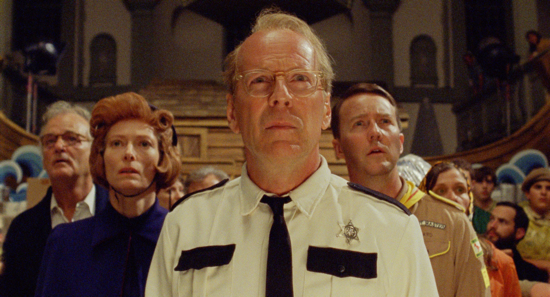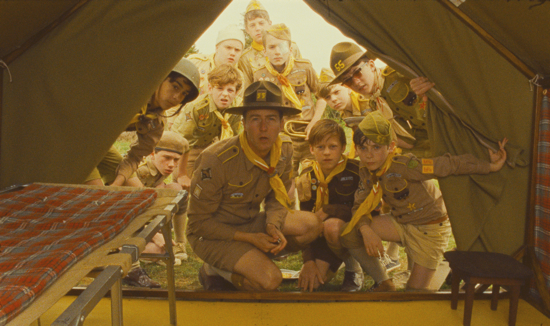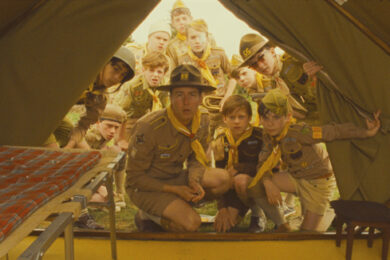A child’s perception of scale is inherently warped. The unbridled imagination of childhood can turn a tented blanket into a labyrinthine cave; a scrawled map and a lawn into an archaeological adventure; a scratched 7-inch into the London Philharmonic Orchestra, and so on. Wes Anderson’s new film serves as a madeleine for the unpredictable beauty of the juvenile mind: at the heart of Moonrise Kingdom is nostalgia for lost youth.
Set in 1965, on the fictional New England island of New Penzance, it tells the story of two 12-year-olds, a precocious orphan Boy Scout Sam Shakusky (Jared Gilman) and reserved avian school songstress Suzy Bishop (Kara Hayward) who, dissatisfied with their home lives, abscond together. Equipped with Sam’s scout training and Suzy’s bright curiosity the small town island enclave becomes an expansive world of outward bound exploration for the young lovers, navigated in perfect Tom Sawyer and Huck Finn fashion with all the appropriate tools: maps, binoculars, Davy Crockett hat, cork pipe, Françoise Hardy records, cat.
The elopement raises alarm in town, and in doing so reveals the various dysfunctions of the adult population. Bruce Willis is a down on his luck bachelor patrolman; Suzy’s parents are played excellently by Frances McDormand and indomitable Anderson collaborator Bill Murray; Edward Norton rolls his shorts up to regulation length as Scout Master Ward; and Tilda Swinton’s character is named only as ‘Social Services’. In their scrabble to recover the two preteens, we see the adults have little more idea about how to play the game of life than our intrepid adventurers. This seems to be a recurring theme in Anderson’s work: do any of us really want to grow up? Do any of us even know how to grow up? (Think Dignan in Bottle Rocket, the eponymous Royal Tenenbaum, or even Mr Fox.)
As a filmmaker with such personal concerns, Wes Anderson has always invited haters, those ready to throw out banalities like ‘he’s too quirky’, ‘where are the jokes?’ and ‘I can’t relate to any of these people’. Anderson deserves vehement defence against such accusations, preferably with the same home made weapons Edward Norton’s scout troop use in Moonrise Kingdom. He is one of cinema’s good guys. Not just for his awkward/affable public image, but because the kind of films he makes and the unashamedly authored aesthetic of his work always have something interesting to say. It is less a matter of taste, and more an ability to engage. And once his movies are engaged with they are always rewarding on some level.
However, you can’t help but feel that much of his current offering is playing straight into the hands of his detractors. Tracking shots seemingly last for minutes where often a cut would do the job just as well, while the Sixties setting allows for some frankly overblown choices in production design, the props at times so mannered you could invite them to a silver service dinner. All features that will appeal to fans and film buffs, but perhaps not credos to convert the unbelievers.
Having said that, such touches confirm Anderson as one of the most distinctive and accomplished voices working in American cinema today. The film is a masterpiece of composition; every frame planned with meticulous detail, the colour palette of lush greens, ormolu yellows and beryl blues brilliantly evoking 1960s New England. The result is a thing of the utmost formal beauty.

There is a nagging doubt, however, that in this obsession with the visual the story itself is suffering a little. Is the portrait of first, crushing love between the two youngsters quite as intimate as it could have been? You find yourself wishing that, once or twice, he’d asked cinematographer Robert Yeoman to pick up a handheld camera and get in among the actors, to capture something spontaneous, to throw some paint at the wall and see what stuck. This is a rites of passage children’s adventure, but everything feels a little safe. Rarely are Sam and Suzy in the kind of real jeopardy that brings hearts to audience mouths, and we never truly fear for the children’s safety – as is the case in, for example, Rob Reiner’s Stand By Me (1986) or Jonathan Kaplan’s Over The Edge (1979). Danger perhaps has no place in the fairy tale world Anderson has created, but it might just have turned up the heat on the young lovers’ amour fou.
A quick glance at the writing credits (this picture was co-penned by Roman Coppola) throws up one possible theory for this perceived lack of heart. Anderson scripted his very best films with Owen Wilson, while The Life Aquatic With Steve Zissou and Fantastic Mr Fox were Noah Baumbach co-writes. Maybe the auteur needs some kind of improvisatory influence on his creations to give them their full effect. Wilson’s persona in particular, as Southern mischief-maker and laid back dude, is perhaps the perfect foil to Anderson’s formal brilliance. It’s easy to see him as the Hyde to the director’s Jekyll, the Eli Cash to Anderson’s Richie Tenenbaum.
But one shouldn’t detract too strongly from Moonrise Kingdom, as it is still an excellent piece of work. Jason Schwartzman’s turn as the rogue scout captain who attempts to facilitate the couple’s escape from the island is the kind of comic cameo he invariably shines in, and you wish he was asked to do more often. The infinitesimal attention to detail in every shot is a staggering accomplishment, perhaps the most densely complex frames seen in any of Anderson’s films to date. And Bill Murray – who else? – has the movie’s knock out line. His browbeaten Walt Bishop shuffles past his remaining kids in the living room, wine bottle to hand, chest bare, axe swung over his shoulder, and deadpans: "I’ll be out back. I’m going to find a tree to chop down."
If you like Anderson’s work, this is not going to disappoint. If you’re undecided you might want to strap on your garters, square knot your neckerchief and venture out into Moonrise Kingdom‘s beautiful wilderness, as the Wes Anderson Merit Badge is a worthy addition to any cinematic sash.



